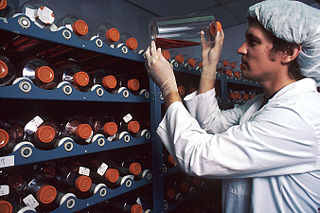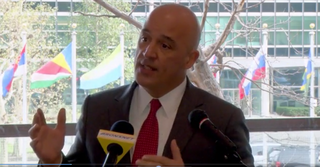
The Alcohol and Tobacco Tax and Trade Bureau, statutorily named the Tax and Trade Bureau and frequently shortened to TTB, is a bureau of the United States Department of the Treasury, which regulates and collects taxes on trade and imports of alcohol, tobacco, and firearms within the United States.

The Animal and Plant Health Inspection Service (APHIS) is an agency of the United States Department of Agriculture (USDA) based in Riverdale, Maryland responsible for protecting animal health, animal welfare, and plant health. APHIS is the lead agency for collaboration with other agencies to protect U.S. agriculture from invasive pests and diseases. APHIS is the National Plant Protection Authority for the U.S. government, and the agency's head of veterinary services is Chief Veterinary Officer of the United States.

The pharmaceutical industry discovers, develops, produces, and markets drugs or pharmaceutical drugs for use as medications to be administered to patients, with the aim to cure them, vaccinate them, or alleviate the symptoms. Pharmaceutical companies may deal in generic or brand medications and medical devices. They are subject to a variety of laws and regulations that govern the patenting, testing, safety, efficacy and marketing of drugs.

The Public Health Cigarette Smoking Act is a 1970 federal law in the United States designed to limit the practice of smoking. As approved by the United States Congress, the act required a stronger health warning on cigarette packages, saying "Warning: The Surgeon General Has Determined that Cigarette Smoking Is Dangerous to Your Health". It also banned cigarette advertisements on American radio and television.

The Center for Science in the Public Interest (CSPI) is a Washington, D.C.-based non-profit watchdog and consumer advocacy group that advocates for safer and healthier foods.

The Johns Hopkins Bloomberg School of Public Health (JHSPH) is part of Johns Hopkins University in Baltimore, Maryland, United States. As the first independent, degree-granting institution for research in epidemiology and training in public health, and the largest public health training facility in the United States, the Bloomberg School is a leading international authority on the improvement of health and prevention of disease and disability. The school's mission is to protect populations from illness and injury by pioneering new research, deploying its knowledge and expertise in the field, and training scientists and practitioners in the global defense of human life. The school is ranked first in public health in the U.S. News and World Report rankings and has held that ranking since 1994.

Medical research, also known as experimental medicine, encompasses a wide array of research, extending from "basic research", – involving fundamental scientific principles that may apply to a preclinical understanding – to clinical research, which involves studies of people who may be subjects in clinical trials. Within this spectrum is applied research, or translational research, conducted to expand knowledge in the field of medicine.

Alcohol advertising is the promotion of alcoholic beverages by alcohol producers through a variety of media. Along with tobacco advertising, alcohol advertising is one of the most highly regulated forms of marketing. Some or all forms of alcohol advertising is banned in some countries. There have been some important studies about alcohol advertising published, such as J.P. Nelson's in 2000.
The Coalition for the Prevention of Alcohol Problems is a Washington D.C.-based coalition of 24 public health and consumer groups co-chaired by George Hacker of the Alcohol Policies Project at the Center for Science in the Public Interest and Stacia Murphy of the National Council on Alcoholism and Drug Dependence.

Truth is a national campaign aimed at eliminating teen smoking in the United States. "truth" produces television and digital content to encourage teens to reject tobacco and to unite against the tobacco industry. When "truth" launched its campaign in 1998, the teen smoking rate was 23%. In 2018, tobacco products were used by 7.2% of middle schoolers and 27.1% of high schoolers. In August 2014, "truth" launched "Finish It", a redesigned campaign encouraging youth to be the generation that ends smoking.

Food policy is the area of public policy concerning how food is produced, processed, distributed, and purchased. Food policies are designed to influence the operation of the food and agriculture system. This often includes decision-making around production and processing techniques, marketing, availability, utilization and consumption of food, in the interest of meeting or furthering social objectives. Food policy can be promulgated on any level, from local to global, and by a government agency, business, or organization. Food policymakers engage in activities such as regulation of food-related industries, establishing eligibility standards for food assistance programs for the poor, ensuring safety of the food supply, food labeling, and even the qualifications of a product to be considered organic.

Food safety in China is a growing concern relating to agriculture. China's principal crops are rice, corn, wheat, soybeans, and cotton in addition to apples and other fruits and vegetables. China's principal livestock products include pork, beef, dairy, and eggs. The Chinese government oversees agricultural production as well as the manufacture of food packaging, containers, chemical additives, drug production, and business regulation. In recent years, the Chinese government attempted to consolidate food safety regulation with the creation of the State Food and Drug Administration of China in 2003; officials have also been under increasing public and international pressure to solve food safety problems. Chinese Vice Premier Li Keqiang said, "Food is essential, and safety should be a top priority. Food safety is closely related to people's lives and health and economic development and social harmony," at a State Council meeting in Beijing.
The Johns Hopkins Center for Health Security is an independent, nonprofit organization of the Johns Hopkins Bloomberg School of Public Health, and part of the Environmental Health and Engineering department. It is concerned with the areas of health consequences from epidemics and disasters as well as averting biological weapons development, and implications of biosecurity for the bioeconomy. It is a think tank that does policy research and gives policy recommendations to the United States government as well as the World Health Organization and the UN Biological Weapons Convention.
Orin Levine is a recognized expert in the fields of international public health, child survival, and pneumonia. He is currently the Director of Vaccine Delivery at the Bill & Melinda Gates Foundation in Seattle, USA. In the past he was the Executive Director of the International Vaccine Access Center (IVAC), the Co-Chair of the Pneumococcal Awareness Council of Experts (PACE), and is a Professor at The Johns Hopkins Bloomberg School of Public Health in the Department of International Health. He is also an adjunct assistant professor of Epidemiology at The Rollins School of Public Health at Emory University in Atlanta. Additionally, he is currently president of the American Society of Tropical Medicine and Hygiene (ASTMH) Council on Global Health. He resides in Washington, DC.
Ad Standards manages the complaint resolution process of the advertising self-regulation system in Australia.
Guided Care is a model of proactive, comprehensive health care for people with several chronic conditions. A form of medical home, the model has been developed and tested by a multidisciplinary team of experts at the Roger C. Lipitz Center for Integrated Health Care in the Johns Hopkins Bloomberg School of Public Health. Guided Care is provided by physician-nurse teams in primary care practices to the physicians' most complex patients, mainly older adults with chronic conditions and complicated health needs. It is designed to increase patients' quality of care and quality of life, while improving the efficiency of their use of health care resources, thus reducing their overall health care costs.

There are smoking cessation policy initiatives by the United States government at federal, state and local levels.
The Department of Epidemiology is one of ten academic departments in the Johns Hopkins Bloomberg School of Public Health (JHSPH). The mission of the Department of Epidemiology is to improve the public's health by training epidemiologists and by advancing knowledge concerning the causes and prevention of disease and the promotion of health.

William W. Latimer is an infectious disease epidemiologist. He is the founding dean of the City University of New York, Lehman College School of Health Sciences, Human Services and Nursing in the Bronx, New York; Extraordinary Professor of Psychology, School of Humanities at the University of Pretoria, Pretoria, South Africa; and Producer and Host of Public Health Minute, a radio show aired on public radio stations throughout the US.
Adnan A. Hyder is Senior Associate Dean for Research and Professor of Global Health at the George Washington University Milken Institute School of Public Health.